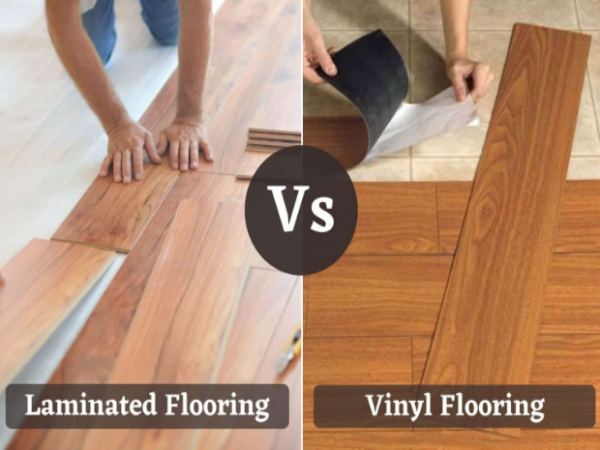Laminate vs Vinyl Flooring: Key Differences Explained

Choosing between Laminate and Vinyl Flooring depends on your needs and what you like. These two are the most popular options in the current year. They both offer the best durability and affordability. You will get access to their different styles. They copy the looks of natural wood, tile, and stone. So, it’s better to understand the difference between them and make the right decision for your space.
Laminate Flooring Explained
Laminate flooring was introduced in the 1970s, and it was considered an alternative to natural wood floors.
The planks are made from wood byproduct and have four layers:
- The backing layer provides stability and moisture resistance.
- Base layer is made of high-density fiberboard or compressed wood fibers
- The photographic print layer creates real visuals of wood, stone, etc.
- The protective wear layer protects against scratches, stains, etc.
It is popular due to its real wood look. If you are planning to install it in your space. Get expert Construction Cost Estimating Services for your project. You can complete your projects with the right materials. Well, mostly homeowners choose laminate flooring to save money.
Vinyl Flooring Explained
It is made up of polyvinyl chloride. It is designed to copy natural flooring elements such as wood or stone. Luxury vinyl planks have three to four layers:
- The backing layer provides stability
- Core layer can be flexible PVC (LVP), Stone Plastic Composite (SPC), or Wood Polymer Composite (WPC)
- Print/design layer provides high-quality images of wood, stone, or tile
- Wear layer: clear urethane protective coating
People who go with vinyl flooring want waterproof and stylish finishes. Modern vinyl comes in various forms:
- luxury vinyl plank (LVP)
- luxury vinyl tile (LVT)
- sheet vinyl
Difference between Laminate vs Vinyl Flooring
Water Resistance
Vinyl Flooring
Vinyl flooring is 100% waterproof, which makes it a better option. It is mostly used in washrooms, laundry rooms, etc. If we compare it with laminate, vinyl does not absorb water and prevents leaks.
Laminate Flooring
Laminate flooring offers little water resistance. Maybe the advanced lemonade flooring has waterproof options. But that traditional laminate is not resistant to water. The reason is that it is made up of fibreboard. That is why it swells.
Appearance and Aesthetics
Laminate Flooring
Laminate flooring provides realistic three-dimensional embossing. It consists of images of wood, ceramic, or stone. The advanced image technology used in laminate flooring provides real textures and patterns.
Vinyl Flooring
Vinyl flooring has made improvements in the visuals. It is used with luxury vinyl plank and luxury vinyl tile to create a realistic look. This way it resembles the natural materials. It is thick, so embossing is easier.
However, in style, they are almost equal, but laminate may have a slight edge for real wood appearances.
Durability
Vinyl Flooring
Vinyl flooring is more durable than laminate. It is highly resistant to scratches. That is why it can last from 10 to 25 years or more than that if you properly maintain it. If you are tight on budget, then get a professional Flooring Cost Estimation and use your funds smartly.
Laminate Flooring
Laminate flooring is not as durable as Vinyl flooring. Its life is from 10 to 30 years. This depends on the quality of the product. Laminate can resist dents because it consists of:
- scratch-resistant wear layer
- strong fiberboard core
Comfort and Feel Underfoot
Laminate Flooring
Laminate feels warmer due to its thicker construction. It is more comfortable to walk on. That is why homeowners install it in their living areas. Ensure that these floors are properly installed to prevent hollow sound underfoot.
Vinyl Flooring
Luxury vinyl usually has a softer feel. Well, it is softer and quieter underfoot than laminate. This enhances the comfort of occupants. Plus, it also absorbs vibrations from running.
Cost Comparison
They both are budget-friendly when compared to natural flooring materials like hardwood or stone.
Material Costs
Laminate Flooring:
- Budget options are from $0.70 – $2 per square foot
- Standard range is from $1 – $5 per square foot
- Quality products are $3+ per square foot
- Total installed cost is $2 – $14 per square foot
Vinyl Flooring:
- Budget options are less than $1 per square foot
- Standard range is $1 – $5 per square foot
- Luxury vinyl planks are from $2 – $7 per square foot
- Total installed cost is from $1- $16 per square foot
Installation Costs
- Laminate professional installation: $1 – $3 per square foot
- Vinyl professional installation: $1 – $5 per square foot
However, vinyl is a bit cheaper. It is better to rely on a reliable Construction Estimating Company and choose the right materials for your project. However, premium vinyl options are more expensive.
Conclusion
After reading this guide about laminate vs vinyl flooring, you can now choose the right option for your project. It simply depends on your specific needs. But it is better to outsource Construction Material Takeoff from an expert company and invest your money in the right thing. In this inflationary time, managing a budget is the most difficult thing, so get professional help and prevent over-budgeting.



